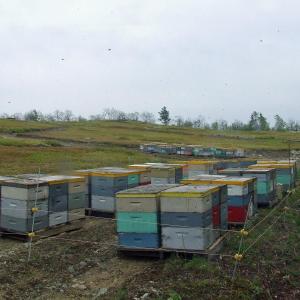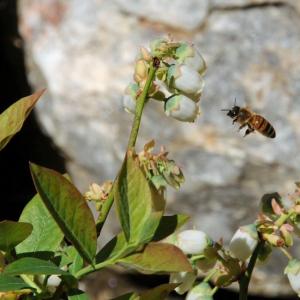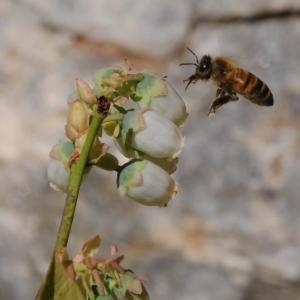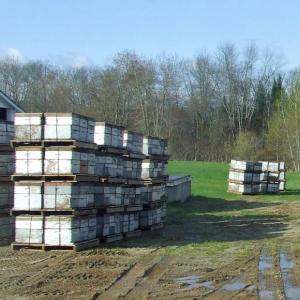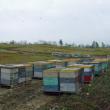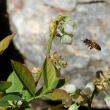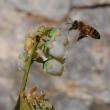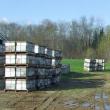Maine Wild Blueberries: They don’t pollinate themselves
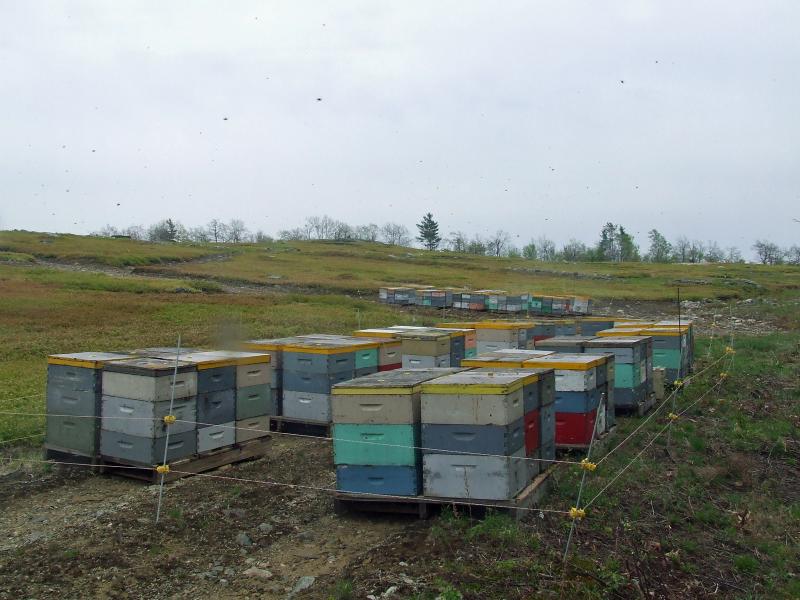 Commercial beehives at R.T. Allen and Sons field on Vienna Mountain in Mount Vernon. (Courtesy Dave Smith/Sparky’s Apiary)
Commercial beehives at R.T. Allen and Sons field on Vienna Mountain in Mount Vernon. (Courtesy Dave Smith/Sparky’s Apiary)
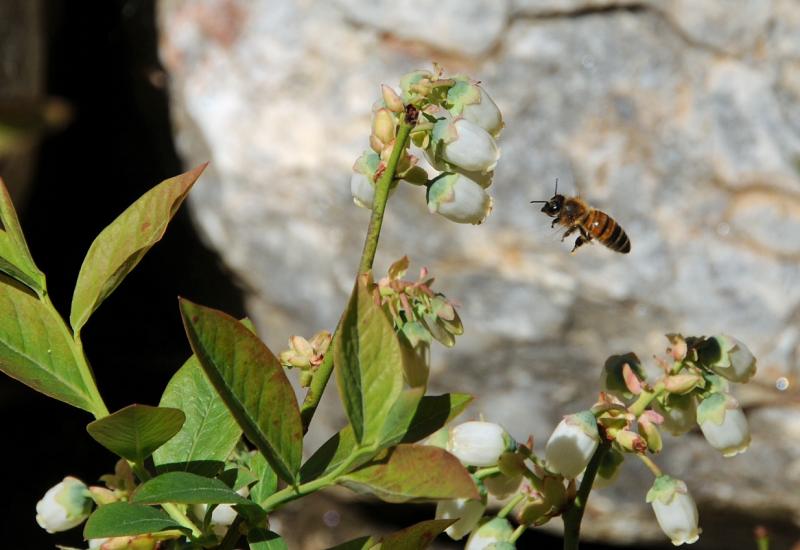 Honeybee flying toward a blueberry blossom. (Photo by Charles Gale)
Honeybee flying toward a blueberry blossom. (Photo by Charles Gale)
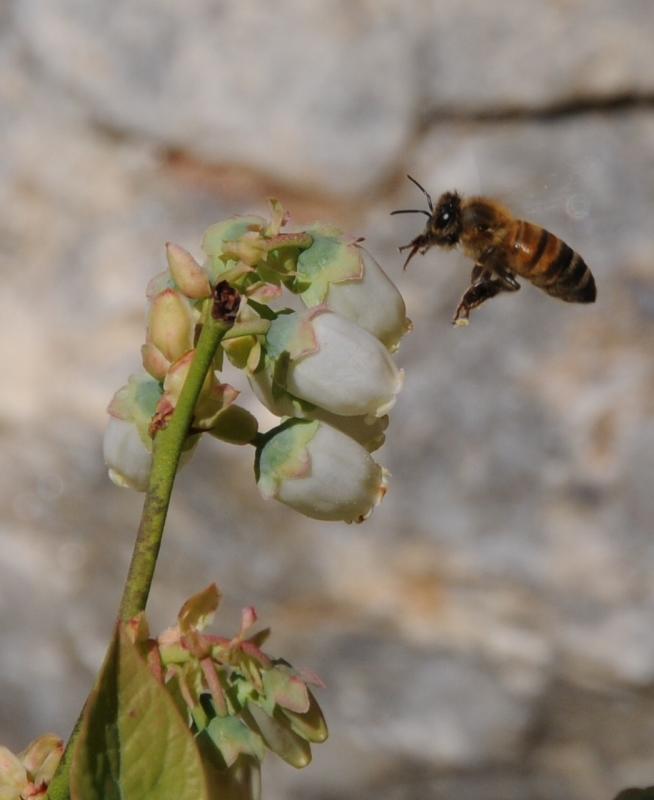 Honeybee flying toward a blueberry blossom. (Photo by Charles Gale)
Honeybee flying toward a blueberry blossom. (Photo by Charles Gale)
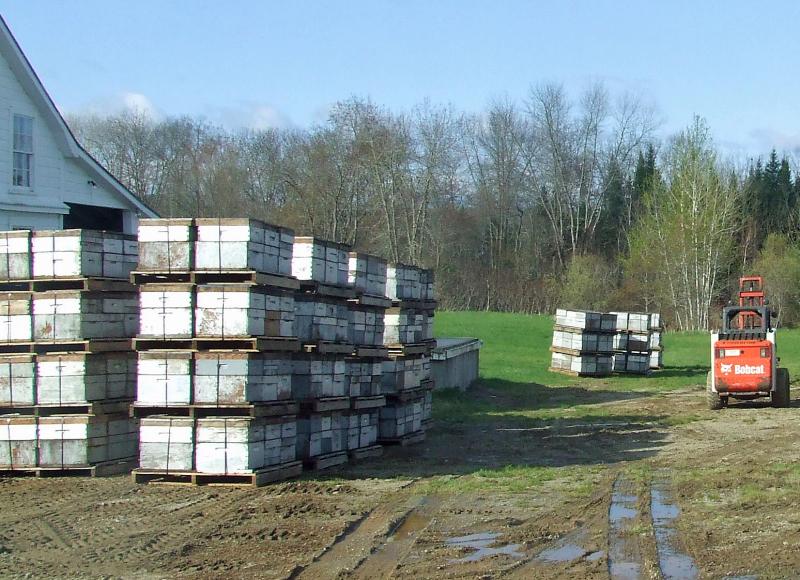 Honeybees and their hives staged and ready for placement in fields at Coastal Blueberry in Union. (Courtesy Dave Smith/Sparky’s Apiary)
Honeybees and their hives staged and ready for placement in fields at Coastal Blueberry in Union. (Courtesy Dave Smith/Sparky’s Apiary)
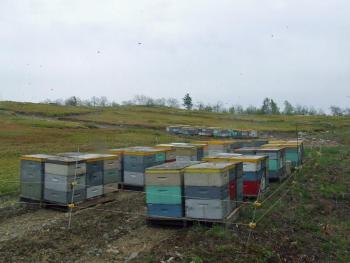 Commercial beehives at R.T. Allen and Sons field on Vienna Mountain in Mount Vernon. (Courtesy Dave Smith/Sparky’s Apiary)
Commercial beehives at R.T. Allen and Sons field on Vienna Mountain in Mount Vernon. (Courtesy Dave Smith/Sparky’s Apiary)
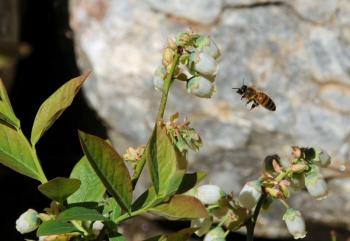 Honeybee flying toward a blueberry blossom. (Photo by Charles Gale)
Honeybee flying toward a blueberry blossom. (Photo by Charles Gale)
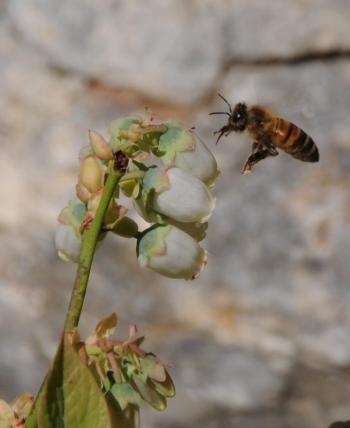 Honeybee flying toward a blueberry blossom. (Photo by Charles Gale)
Honeybee flying toward a blueberry blossom. (Photo by Charles Gale)
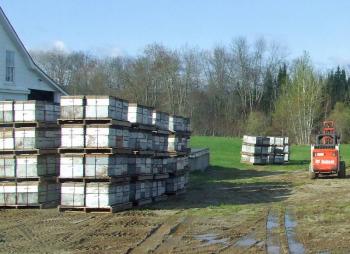 Honeybees and their hives staged and ready for placement in fields at Coastal Blueberry in Union. (Courtesy Dave Smith/Sparky’s Apiary)
Honeybees and their hives staged and ready for placement in fields at Coastal Blueberry in Union. (Courtesy Dave Smith/Sparky’s Apiary)
Maine wild blueberries are picked and processed by humans, but they are pollinated by insects, namely honeybees, bumblebees and native bees. Insects visit plants in search of food, in the form of nectar, and in return, they spread the pollen that collects and sticks to their bodies as they fly from blossom to blossom.
Maine has more than 50 species of native bees associated with lowbush blueberries, but the bees' decline in the wild has made the business of commercial, or managed pollination ever more important for blueberry growers. According to Dave Smith, owner of Sparky's Apiaries in Hope, between 70,000 and 80,000 hives are brought into Maine to pollinate the commercial blueberry crop.
The bulk of Maine's intense wild blueberry cultivation is Down East, along coastal regions, with moderate to intense cultivation across all of Lincoln, Knox and Hancock counties.
Smith is also the assistant to State Apiarist Tony Jadzcak. It's Jadzcak's job to inspect and grade commercial beehives, as well as inspect hobby and backyard beehives for disease or reports of colony loss. Smith and/or Jadzcak also make the rounds annually to county bee clubs to talk about the state of bees in Maine and answer questions about best practices, hive management, and disease and pest controls.
Smith was planning to head Down East in early June with Jadzcak to inspect commercial hives.
"The hives have been in the fields for about three weeks now and once the fruit is set, the petals of the flowers drop off; they're done," said Smith. “We had all that hot weather last week, so it went fast around here, locally. Down East and Sullivan have peaked, but there is still a lot of blossom out there."
Smith said commercial hives come from all over the country, with the bigger outfits wintering their hives in Florida, Texas and Louisiana.
Commercial beekeepers are paid according to how strong their hives are when they arrive in Maine, in the field, and that's where Smith and Jadzcak come in. There is a base grade that offers the beekeeper a base rate (e.g., $82) for each hive with so many bees and brood, and then they are paid a percentage less if there are fewer than the base grade, and a percentage more if the hives has more bees and more brood.
"Everything I have looked at this year, the quality is up," said Smith. "Hives with brood in them indicates colony strength, and the more bees there are, the more efficient it is as a pollinating unit. You can bring in two of the lesser-grade hives and it won't equal one of the stronger hives. A higher grade hive will fly way harder. There are more adult bees in the colony and they have a goal to keep the colony going."
Smith said the blueberry grower ultimately isn't paying a lot more for that hive, but they are getting "more bang for their buck" when the commercial beekeeper brings in strong hives.
But there is a caveat to a strong hive, and that is that the colony can be prone to swarming. So there is a delicate balance, said Smith.
There is plenty of talk around the country about the plight of bees, and rightly so. But Smith said so far, he has never seen health issues with the commercial beekeepers coming into Maine. Except, that is, when it's the tail end of the bloom, and it's Down East, where all there is for the bees if blueberries.
"It's like putting too many cows in the field. It's a monoculture, so when the bloom is over, you want to get your bees out of there. And if you keep food on them, even during the bloom, they will do alright and look good, and be pumped up, when they leave the field and head off to the next location," said Smith.
And where do the commercial bees go after their work is done pollinating Maine's blueberries?
Well, when a beekeeper has 30,000 hives out, and he can only fit 446 on each truck, he first has to line up 68 trucks to do the hauling. Then, he has to find another crop, and a place with decent weather.
"Depending on who they are, some go to cranberries in Massachusetts, some to cranberries in Michigan or Wisconsin, some to cucumbers in Ohio and still others split the load and send some home for honey production," said Smith. "The nice thing about bees, is you can pick up and go, search for a crop and good weather. If one state doesn't look promising, if it's too wet or too dry, you move on."
Event Date
Address
United States

